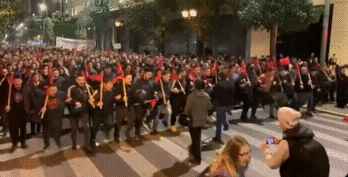#privatisation
Video
Social Security and Medicare and debt
Manufacturing consent
#tiktok#Manufacturing Consent#Social Security#Medicare#privatisation#medicare for all#public education#debt#us government#government#government and politics#defunding#defund#profits
905 notes
·
View notes
Text
From 1981 to 1990, when most of China’s socialist provisioning systems were still in place, the country’s extreme poverty rate was on average only 5.6 per cent, substantially lower than in capitalist economies of comparable size and income at the time: 51 per cent in India, 36.5 per cent in Indonesia, and 29.5 per cent in Brazil. China's comparatively strong performance is corroborated by data on other social indicators. Moreover, extreme poverty in China increased during the capitalist reforms of the 1990s, reaching a peak of 68 per cent, as privatisation inflated the prices of essential goods and thus deflated the incomes of the working classes. These results indicate that socialist provisioning policies can be effective at preventing extreme poverty, while market reforms may threaten people's ability to meet basic needs.
Capitalist reforms and extreme poverty in China: unprecedented progress or income deflation?
210 notes
·
View notes
Photo



March 3, 2023 - Thousands of protesters angry about the deadly train crash, that was caused by privatisation and government inaction and killed 56 people, took to the street, clashed with police and burned a cop car in Athens, Greece. [video]/[video]
#acab#riot#resistance#athens#greece#gif#2023#fire#flames#police car#riot police#anticapitalism#corruption#privatisation#red flag
339 notes
·
View notes
Text
Investigation after 57 world triathlon championship swimmers fall sick and get diarrhoea in Sunderland race
This is what happens when you privatise water companies
59 notes
·
View notes
Text



15 notes
·
View notes
Text
The state of this! “The Labour leadership is aware we are soft testing various ideas but have asked us to keep it highly confidential so please don’t forward this email.”
56 notes
·
View notes
Text

Good to see that our privatised railways are performing well for the rich private shareholders... they're certainly not much good at providing a decent and affordable rail service for the rest of the population.
Typical Tory stitch-up of an essential public service, so that it pays their wealthy shareholder cronies and party donors, but milks the taxpayers and users dry.
Of course, when the private franchised operators go into the red and fail, it's the taxpayers who bail out the business, not the profiteering shareholders who've been taking fat dividends for years.
The CEOs still get paid obscene salaries and bonuses as a reward for failure, of course. That's how corrupt and cynical Tory 'free market' capitalism works... heads they win, tails we lose.
#uk politics#britain#fuck the tories#conservative party#tory party#uk#rich v poor#british politics#inequality#privatisation#victims of capitalism#capitalist dystopia#profiteering
23 notes
·
View notes
Text
#politics#tory#conservative party#uk#private health#ukpol#neoliberalism#privatisation#corruption#lobbying
138 notes
·
View notes
Text

00111101.
Waiting for the bus,
A cracked bench, ruined shelter.
There are no busses.
One day I'll ask her just why
She waits for a dinosaur
19 notes
·
View notes
Text
Campaigners say a car crash of different disasters has left the UK with some of the worst bathing water quality in Europe.
Anger is rising over the dumping of untreated sewage into the UK’s rivers and seas.
The situation attracted international attention at the end of March during the famous Oxford- Cambridge Boat Race.
Rowers were warned about potentially dangerous E. coli bacteria in the River Thames ahead of the event.
A combination of agricultural runoff and sewage spills now mean the UK is ranked among some of the worst countries in Europe for bathing water quality. Why have its rivers and seas ended up in this state?
Why has sewage pollution got so bad in the UK? -Many campaigners track the problem back to the privatisation of England’s water utilities in 1989. Companies were created as regional monopolies, split up by river catchment areas.
“The water industry as a whole was privatised in 1989 with zero borrowings,” says founder and chair of campaign group River Action, Charles Watson. Following the 2007-9 financial crisis cheap borrowing saw their debts grow to extraordinary levels.
“Today the water industry is carrying £60 billion [€70 billion] of borrowings.”
Campaigners say sizable profits were instead distributed to shareholders. Customer bills were also kept low leading to very little reinvestment in infrastructure or improvements to services.
Populations have grown since the 1980s and homes are more tightly packed in urban areas. More demand is now being placed on the existing infrastructure.
Add on top of this an increasing number of extreme weather events over the last decade - Storm Kathleen was the UK’s 11th named storm of this season.
continue reading
9 notes
·
View notes
Video
First they came for the socialists, and I did not speak out—
Because I was not a socialist.
Then they came for the trade unionists, and I did not speak out—
Because I was not a trade unionist.
Then they came for the Jews, and I did not speak out—
Because I was not a Jew.
Then they came for me—and there was no one left to speak for me.
https://en.wikipedia.org/wiki/First_they_came_...
Etymology
The term ‘privatizing’ first appeared in English, with quotation marks, in the New York Times, in April 1923, in a translation of a German speech referring to the potential for German state railroads to be bought by American companies.[5] In German, the word Privatisierung has been used since at least the 19th century.[6] Ultimately, the word came to German through French from the Latin privatus.[7]
The term reprivatization, again translated directly from German (Reprivatisierung), was used frequently in the mid-1930s as The Economist reported on Nazi Germany's sale of nationalized banks back to public shareholders following the 1931 economic crisis.[8]
The word became common in the late 1970s and early 1980s as part of UK prime minister Margaret Thatcher's economic policies. She was drawing on the work of the pro-privatization Member of Parliament David Howell, who was himself drawing on the Austrian-American management expert Peter Drucker's 1969 book, The Age of Discontinuity.[8]
https://en.wikipedia.org/wiki/Privatization
137 notes
·
View notes
Text
Lots of talk about the NHS at the moment, people advocating for a system like “Germany or France” in the UK.
Well, that doesn’t work because a) both Germany and France spend significantly more on healthcare than the UK, and b) it would take a lot more out of working people’s pockets than a small tax increase to fund public services.
It’s solely ideological. The Tories want to move towards a private health insurance system because a) some of them will make a mint on it, and b) because if your health insurance is tied to your work, it’s harder for you to quit your job. There’s a massive labour shortage in the UK, especially post Brexit, which isn’t talked about much.
Never mind striking, it is very easy for people to simply vote with their feet about working conditions which they don’t like. It would be harder if healthcare was in any way tied to our jobs.
103 notes
·
View notes
Text
Britain is asset rich. National wealth – a mix of property, business, financial and state assets – stands at almost seven times the size of the economy. That is double the level of the 1970s.
This has not come about as a result of investment and productivity growth. Instead, much of this private-wealth mountain is unearned – the product of windfall gains, resulting from state-driven asset inflation, the mass sell-off of former public and commonly held assets (from land to industries) and the exploitation of corporate power. As philosopher and civil servant John Stuart Mill quipped during the Industrial Revolution, it’s “getting rich while asleep”.
This has widened the wealth gap. The top tenth of Britons now holds nearly half of the UK’s private wealth. The poorest half’s share, meanwhile, has never exceeded one-tenth.
As a former US supreme court justice Louis Brandeis famously declared – a century ago – it was possible, in the US, to have either democracy or great wealth concentrated in the hands of a few – but not both.
Britain today badly fails Brandeis’s democracy test. Yet, the Labour party’s leaders have no declared plans – at least, as yet – to close this gap.
153 notes
·
View notes
Text
Private Sector Good, Public Sector Bad? (3)
This is the third part of a look at former public services and utilities in Britain that have been privatised or part-privatised in the name of neoliberal economics and the mistaken belief that private enterprise is ALWAYS more efficient than publicly run bodies.
The National Health Service
The Tory Party and successive Tory governments, including the Sunak administration, vehemently deny they are slowly privatising the NHS.
“Sunak pledges to cut waits with greater healthcare choice but denies NHS privatisation plan." (Health and Protection: 04/01/23)
Such denials are deliberately misleading. According to the World Health Organisation:
“Privatisation is where non-government bodies become increasingly involved in the financing or provision of health care services”.
The Tory Health Care Act of 2012 removed the "duty of government” to provide NHS services directly, opening up NHS care provision to the private sector. This trend has been further accelerated by the 2022 Heath and Care Act. The Guardian had this to say about the change in the law:
“The new bill will continue the dismantling of the NHS, this time by adopting more features from the US health system. For anyone who cares about the NHS, this should set off alarm bells.” (Guardian: 07/12/21)
What we need to remember when reviewing the provision of public services by private companies is that the first duty of a private company is to make profits for it’s shareholders. The profit driven motive of private enterprise may lead to more cost savings but often at the expense of quality of service
“There is only a small number of studies addressing the effect of privatisation on the quality of care offered by health-care providers, and yet within this small group of longitudinal studies, we find a fairly consistent picture. At the very least, health-care privatisation has almost never had a positive effect on the quality of care." (Lancet: "The effect of health-care privatisation on the quality of care”, March 2024
In 2019, (November 29th) the Guardian reported that private firms had received £15bn over a five-year period for NHS provision. By 2019/20 Health Care Commissioners were spending £10bn a year on services delivered by the private sector. (The Kings Fund: Is the NHS being privatised, 01/03/21)
Despite this massive increase in NHS private provision, we all know the health service is on its knees. Before 2010 multi-year funding of the largely publicly run NHS saw the NHS improve its service provision. 14 years of Tory government, two health care acts later, and we see a total reversal in those trends. By 2014 signs of stress were becoming apparent. David Cameron and George Osborne deliberately starved the NHS of money, NHS budgets rising on average only 1.4% between 2009-19 compared to the 3.7% yearly rises since the NHS was first established.
The NHS is slowly bleeding to death: emergency departments are overcrowded, extended waiting times in A&E are leading to over 200 unnecessary deaths per week, there are not enough hospital beds, staff are demoralised, and doctors strikes continue because the government refuses to pay public sector workers a fair wage. Waiting lists continue to grow, it is impossible to find a NHS dentist and sick people have to wait weeks for a simple GP appointment.
This systematic rundown of the NHS by successive Tory governments is not all bad news as privatisation has benefited the lucky few.
Staff agencies are doing very nicely thank you, the BBC reporting that:
“Companies providing freelance staff to the NHS to cover for big shortages of doctors and nurses have seen their income rise by tens of millions of pounds since 2019.” (24/03/23)
Total spending on agency staff in England was £3bn in 2021, one hospital reportedly paying £5200 to a free-lance doctor for a single shift. It would be nice to say that doctors are not complicit in the gradual privatisation of the NHS but that would be untrue.
“Hundred’s of England's NHS consultants have shares in private clinics.” (Guardian: 21/01/22)
Over a billion pounds has been generated by these set ups since 2015
But it is not only doctors who profit personally from privatisation. During the pandemic, top Tories were very quick to pass on lucrative contracts to their friends in business. These largely unscrutinised public contracts have drawn accusations of “cronyism” and "chumocracy". Others have been more blunt, the Financial Times (06/08/21) asking the question: “When does cronyism become corruption?"
The shortage of PPE during the pandemic led to contracts being awarded to companies without competition. Literally billions of pounds were given to private companies to supply gowns, gloves, and face masks.
“But the way these deals have been given to firms has led to concerns over a lack of detail about why particular suppliers were chosen. The government has also been accused of favouring firms with political connections to the Conservative Party with a "high-priority lane". (BBC News: 20/04/21)
This accusation turned out to be true.
"UK government’s ‘VIP lane' for PPE suppliers was unlawful. High Court rules.” (Financial Times 12/01/22)
Although Michael Gove claimed that “every single procurement decision" went through an eight-stage-process” the courts found that nearly fifty PPE deals were fast tracked by Conservative ministers, who awarded contracts worth £5bn to companies with political or Whitehall connections. Four Tory MP’s and three Tory peers were named as “referrers” Michael Gove, Penny Mordant and Esther McVey are said to have personally recommended firms.
Some MP’s have done a lot more than fast-tracking private health care provision. Many of them have actually invested in private health care companies while others are happy to accept financial donations from them.
Wes Streeting, Shadow Health Secretary and the poster boy for Keir Starmer’s Labour Party, is said to have accepted “£22,5000 in private donations from private health firms last year.” (VOX Political: 30/04/23) Other Labour notaries are also said to have financial connections to private health care companies. Keir Starmer has received £157,500, Yvette Cooper has received £295,205, and Dan Jarvis has received £137,500. (Labour Heartlands: Selling Out the NHS: The Shocking Links Between Labour MP’s and Private Healthcare Donations: 17/06/23)
On the Conservative side, The Mirror (21/01/23) reports that Penny Mordant accepted £10,000 from care home firm Renaissance Care, while ex-health minister Steve Brine made £200 an hour giving “strategic advice” to drug firm Signa, before resigning in 2021. Publicly available information tells that that at least 28 Tory MP’s and Peers have had ties to private health and medical groups. Even the former Health Secretary Sajid Javid had share options in a Californian tech company dealing in health sector software.
So, while the NHS slowly disintegrates for want of proper investment and strategic planning, individual MP's and private health care providers reap the rewards of privatisation. Should this in any way be doubt then listen to what former Conservative Prime Minister John Major had to say as long ago as June 2016:
“The NHS is about as safe from them (Tory Brexiteers) as a pet hamster would be with a hungry python.”
Unfortunately, and to its eternal shame, the same can now be said of Keir Starmer’s Labour Party.
#uk politics#MHS#privatisation#private health#keir starmer#wea streeting#penny mordant#Michael gove#unlawful#donations#cronyism#corruption#morality. deaths#sickmess. underprovision
6 notes
·
View notes
Text
This country is in a proper state
Parts of Kent & Sussex have been without running water for almost a week again (this happened in the same area during winter; apparently SouthEast water doesn't function if it's 'too hot' or 'too cold')
At the same time, a number of beaches are still having to warn people not to go in the sea because these same water companies keep pumping raw sewage into water ways
Privatisation is a blight
40 notes
·
View notes
Text

13 notes
·
View notes